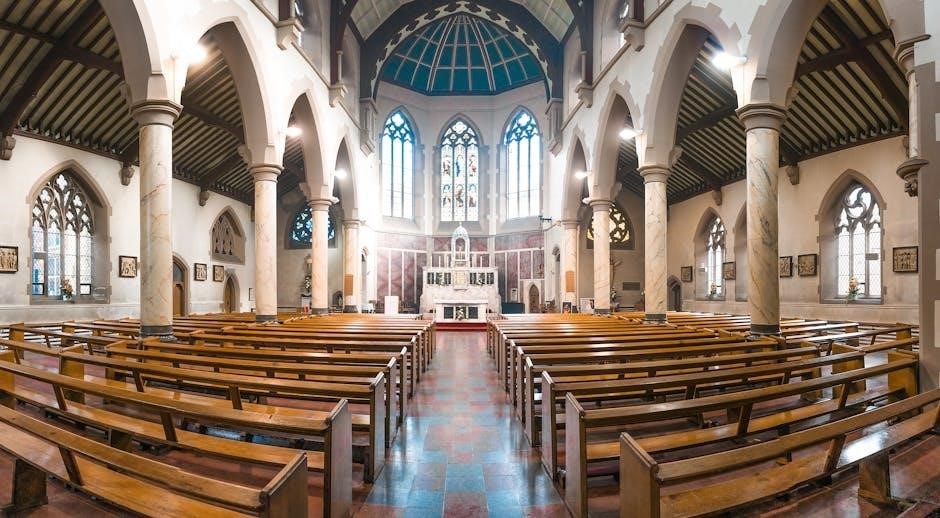Heritage Mass PDF is a comprehensive document showcasing Massachusetts’ rich historical and cultural legacy, preserving its natural heritage, and highlighting significant cultural landscapes and historical sites.
Overview of Heritage Mass PDF
The Heritage Mass PDF is a digitized resource that compiles historical, cultural, and natural heritage information of Massachusetts. It includes digitized collections from the Massachusetts Historical Society, spanning 1792 to 1939, and provides insights into the state’s colonial history and industrial roots. The document also highlights the Massachusetts Natural Heritage Program (MNHP), which tracks rare species and natural communities. Additionally, it features cultural landscapes, historic preservation efforts, and community character initiatives. The PDF serves as a valuable educational tool, offering detailed maps, such as the Priority Habitat Maps, and resources like the Heritage Mass for Choir and Organ. It underscores the importance of preserving Massachusetts’ heritage for future generations.
Significance of Heritage Mass PDF
The Heritage Mass PDF is a vital resource for understanding Massachusetts’ cultural, historical, and natural heritage. It provides digitized access to historical documents, such as the Massachusetts Historical Society’s collections, and insights into the state’s colonial past and industrial evolution. The PDF also highlights the Massachusetts Natural Heritage Program, which tracks rare species and natural communities, emphasizing conservation efforts. Its significance lies in preserving historical records, promoting cultural landscapes, and fostering community engagement. It serves as an educational tool for researchers, educators, and the public, showcasing the state’s legacy and encouraging the preservation of its unique heritage for future generations.
Structure and Content of Heritage Mass PDF
The Heritage Mass PDF is structured into several thematic sections, each focusing on different aspects of Massachusetts’ heritage. It begins with historical overviews, detailing colonial history and the state’s role in American history. The document also includes detailed maps from the Massachusetts Natural Heritage Program, highlighting priority habitats and rare species. Additionally, it incorporates digitized collections from the Massachusetts Historical Society, offering full-text access to historical volumes. The PDF also addresses cultural preservation efforts, community character, and economic impacts of heritage. Its content is enriched with guidelines for managing natural resources and recreational areas, making it a diverse and comprehensive resource for heritage conservation and education.
Historical Background of Massachusetts Heritage
Massachusetts’ heritage is deeply rooted in its colonial history, playing a pivotal role in American independence and industrial growth, with key events shaping its cultural and historical identity;
Colonial History and Its Impact
Massachusetts’ colonial history began with early European settlers, establishing the Massachusetts Bay Colony in 1629, which became a hub for trade, agriculture, and religious freedom. The colony’s proximity to the coast and its abundant natural resources fostered economic growth and cultural development. Key events, such as the Salem Witch Trials in 1692, shaped the region’s identity and legal frameworks. Rivers like the Blackstone and Quinebaug played pivotal roles in powering industries, while the state’s coastal areas supported fishing and maritime trade. This colonial legacy laid the foundation for Massachusetts’ influence in American history, preserving its cultural and natural heritage for future generations. The Heritage Mass PDF initiative highlights these historical milestones, ensuring their preservation and accessibility.
The Role of Massachusetts in American History
Massachusetts played a pivotal role in shaping American history, serving as the birthplace of the American Revolution. Events like the Boston Tea Party and the Battles of Lexington and Concord underscored its leadership in the fight for independence. The state’s colonial history, marked by early settlements and maritime trade, laid the groundwork for its economic and cultural prominence. Massachusetts also became a hub for education and intellectual movements, influencing the nation’s development. Its historical significance is preserved through various initiatives, including the Heritage Mass PDF, which documents the state’s enduring impact on American heritage and identity, ensuring its legacy endures for future generations.
Key Historical Events Shaping Massachusetts Heritage
Massachusetts’ heritage has been profoundly shaped by pivotal historical events. The Salem Witch Trials of 1692 left a lasting impact on the state’s legal and cultural history. The establishment of Plymouth Colony in 1620 marked the beginning of European settlement, influencing the region’s identity. The industrial revolution transformed Massachusetts into a hub for manufacturing and innovation. These events, along with the state’s role in the American Revolution, have cemented its significance. The Heritage Mass PDF highlights these milestones, preserving the stories and legacy of Massachusetts for future generations while fostering a deeper understanding of its cultural and historical importance.
Natural Heritage of Massachusetts
Massachusetts’ natural heritage encompasses diverse landscapes, rare species, and ecosystems. The Massachusetts Natural Heritage Program (MNHP) works to protect these treasures, ensuring conservation and sustainability for future generations.
Massachusetts Natural Heritage Program (MNHP)
The Massachusetts Natural Heritage Program (MNHP) is a state-run initiative dedicated to identifying and protecting the Commonwealth’s rare and endangered species and natural communities. Established to address the growing need for conservation, MNHP maintains a comprehensive statewide database of over 4000 records, including rare species and natural habitats. This program utilizes detailed maps, manuals, and digital files to track and manage these resources effectively. By providing critical data, MNHP supports conservation efforts, informs land-use planning, and collaborates with landowners and developers to ensure the preservation of Massachusetts’ natural treasures for future generations.
Rare Species and Natural Communities
Massachusetts is home to a diverse array of rare species and natural communities, which are crucial to maintaining its ecological balance. The state’s natural heritage includes endangered plants, animals, and unique habitats that require special protection. These species and communities are often found in fragile ecosystems, such as wetlands, forests, and coastal areas. Efforts to conserve these natural treasures involve detailed mapping and monitoring to ensure their survival. The Massachusetts Natural Heritage Program plays a key role in identifying and protecting these resources, collaborating with conservationists and landowners to safeguard biodiversity. Preserving these rare species and natural communities is essential for maintaining the state’s environmental health and heritage.
Priority Habitat Maps and Their Importance
Priority Habitat Maps are essential tools for conservation efforts in Massachusetts. These maps identify areas critical for the survival of rare and endangered species, providing detailed information on habitats and ecosystems. They guide land-use planning, ensuring that development projects do not harm these sensitive environments. By highlighting priority areas, the maps help protect biodiversity and maintain ecological balance. Their importance lies in their ability to inform decision-makers, ensuring sustainable practices that preserve natural heritage for future generations. These maps are regularly updated to reflect new data, making them a vital resource for environmental management and conservation initiatives across the state.
Cultural Heritage Preservation in Massachusetts
Massachusetts actively preserves its cultural heritage through historic preservation efforts, digitized collections, and the protection of cultural landscapes, fostering community character and civic pride across the state.
Historic Preservation Efforts in Massachusetts
Massachusetts leads in cultural heritage preservation through initiatives like the Department of Environmental Management’s (DEM) scenic and cultural landscape inventory. Partnerships with the Massachusetts Historical Commission, Historic Massachusetts, Inc., and The Trustees of Reservations drive these efforts. Historic sites, such as those linked to the Salem Witch Trials, are meticulously preserved. The state also protects industrial heritage, with parks like Blackstone Valley and Canal Heritage State Park showcasing its historical significance. These efforts highlight Massachusetts’ commitment to safeguarding its past for future generations, ensuring its rich history remains accessible and revered. Civic pride and community engagement are central to these preservation activities.
Cultural Landscapes and Their Significance
Cultural landscapes in Massachusetts reflect the state’s rich historical and cultural identity, shaped by its agricultural and industrial heritage. The Blackstone River Valley and Quinebaug-Shetucket Rivers Valley are prime examples, showcasing how rivers have historically powered industries and agriculture. These landscapes are deeply intertwined with the state’s history, offering insights into the lives of past communities; The Massachusetts Natural Heritage Program emphasizes the preservation of rare species and natural communities, highlighting the interconnectedness of natural and cultural heritage. These landscapes not only provide a sense of place but also serve as living archives, preserving the state’s historical narratives for future generations to appreciate and learn from.
Community Character and Civic Pride
Community character and civic pride are deeply rooted in Massachusetts’ heritage, with towns like Dennis preserving their rural identity and historical treasures. Historic preservation efforts, such as those led by the Massachusetts Historical Commission, foster a sense of civic pride by protecting landmarks like the Blackstone Valley and Canal Heritage State Park. These initiatives highlight the state’s industrial and agricultural past, ensuring that future generations can connect with their heritage. By maintaining these cultural landmarks, communities strengthen their unique identity, fostering a shared sense of belonging and pride in their history. This collective effort underscores the importance of preserving Massachusetts’ cultural legacy.

Heritage Mass PDF Resources
Heritage Mass PDF resources include digitized collections from the Massachusetts Historical Society, Heritage Mass for Choir and Organ, and guidelines for managing recreational beach use effectively.
Digitized Collections of the Massachusetts Historical Society
The Massachusetts Historical Society has digitized its first 79 volumes, published between 1792 and 1939, making them fully accessible online through the Internet Archive. These collections provide invaluable insights into the state’s colonial history, cultural development, and significant events. Each volume is available as a downloadable PDF, complete with detailed tables of contents. This initiative has significantly enhanced access to historical documents, benefiting researchers, students, and history enthusiasts. The digitization effort preserves fragile materials while ensuring widespread availability, fostering a deeper understanding of Massachusetts’ heritage and its role in shaping American history. This resource is a cornerstone for heritage education and research.
Heritage Mass for Choir and Organ PDF
The Heritage Mass for Choir and Organ PDF is a musical composition by Owen Alstott, published by OCP in 2010. This edition combines traditional liturgical music with modern arrangements, making it accessible for choirs and congregations. The PDF format allows for easy distribution and use in worship settings. It includes scores for choir, organ, and vocal parts, ensuring versatility in performance. The piece reflects a deep connection to spiritual traditions while offering contemporary expressions of faith. This resource is widely used in liturgical celebrations, fostering a sense of community and shared heritage through music. Its availability as a PDF has made it a popular choice for churches and musical ensembles worldwide.
Guidelines for Managing Recreational Use of Beaches
The Guidelines for Managing Recreational Use of Beaches aim to protect sensitive coastal ecosystems and wildlife, such as piping plovers and terns, while ensuring public access. These guidelines, available as a PDF, outline best practices for managing recreational activities on Massachusetts beaches to balance conservation and tourism. They include measures like designated nesting areas, seasonal closures, and educational signage to raise awareness about the importance of protecting these habitats. By implementing these strategies, the state preserves its natural heritage and ensures sustainable use of coastal resources for future generations. This approach supports both environmental conservation and community enjoyment of Massachusetts’ beaches.

Economic Impact of Heritage in Massachusetts
Heritage preservation in Massachusetts significantly contributes to the economy through tourism growth and job creation, enhancing cultural and historical value while fostering sustainable development and community engagement statewide.
Valuation of Cultural Heritage
Cultural heritage in Massachusetts holds significant economic value, contributing to tourism, urban development, and community identity. Valuation methods, such as contingent valuation and cost-benefit analysis, quantify its importance. Historic sites attract visitors, boosting local businesses and creating jobs. Industrial heritage-based urban projects, like the National Film History Theme Park, showcase economic potential. The Massachusetts Cultural Council supports folk arts and preservation, enriching cultural landscapes. Heritage-based tourism fosters pride and investment in local economies, making cultural preservation a vital economic strategy for sustainable growth and community engagement across the state.
Tourism and Economic Growth
Massachusetts’ rich cultural and natural heritage attracts millions of tourists annually, driving economic growth. Historic sites like the Blackstone River Valley and Quinebaug-Shetucket Rivers Valley draw visitors, boosting local businesses. Heritage corridors and scenic landscapes enhance tourism, supporting hotels, restaurants, and shops. Cultural events and educational programs tied to these sites further attract visitors, fostering job creation and revenue generation. Heritage tourism not only preserves historical assets but also revitalizes local economies, making it a cornerstone of sustainable development in Massachusetts. By promoting its unique heritage, the state ensures long-term economic benefits while preserving its cultural identity for future generations.
Heritage-Based Urban Development
Heritage-based urban development in Massachusetts integrates historical preservation with modern planning, creating vibrant, culturally rich environments. This approach revitalizes historic districts, such as the Blackstone River Valley, by blending heritage conservation with contemporary infrastructure. By preserving iconic landmarks and cultural landscapes, cities maintain their unique identity while fostering economic growth. Heritage corridors and historic parks attract investment, enhancing urban aesthetics and community pride. This sustainable model ensures that development respects the past, supports local economies, and promotes cultural continuity, making Massachusetts a leader in balancing tradition with progress in urban design and planning.
Heritage Mass PDF and Education
Heritage Mass PDF provides educational resources, including digitized historical collections, enabling students and educators to explore Massachusetts’ cultural and natural heritage through accessible and detailed documents.
Role of Heritage in Educational Curriculum
Heritage plays a vital role in educational curriculum by integrating historical, cultural, and environmental perspectives into learning. It connects students to Massachusetts’ rich history, fostering a deeper understanding of its significance. Through Heritage Mass PDF, educators can access digitized collections, rare species data, and cultural landscapes, making complex topics engaging and accessible. This resource bridges the gap between theory and practice, enabling students to explore primary sources and real-world applications. By incorporating heritage into curriculum, schools cultivate critical thinking, historical awareness, and environmental stewardship. This approach not only enriches academic experiences but also nurtures a sense of community identity and pride among students.
Heritage PDFs as Educational Resources
Heritage PDFs serve as invaluable educational resources, offering detailed insights into Massachusetts’ historical, cultural, and natural heritage. These documents provide digitized collections, such as the Massachusetts Historical Society’s archives, enabling students to explore primary sources and historical narratives. Additionally, resources like the Massachusetts Natural Heritage Program’s data on rare species and habitats offer STEM educators tools for environmental education. Heritage Mass PDFs also include cultural content, such as music scores like “Heritage Mass for Choir and Organ,” which can be integrated into arts and music curricula. These resources enrich learning experiences, fostering interdisciplinary understanding and engagement with Massachusetts’ diverse heritage.
Community Engagement Through Heritage Education
Community engagement through heritage education fosters a deeper connection to Massachusetts’ cultural and natural heritage. Programs like the Massachusetts Historical Society’s digitized collections and the Natural Heritage Program’s environmental initiatives provide accessible resources for public learning. Heritage PDFs, such as those detailing rare species and historical sites, empower educators to create interactive lessons. Community events, like historical reenactments and cultural festivals, further involve residents in preserving their heritage. By integrating heritage education into local activities, Massachusetts strengthens civic pride and promotes intergenerational knowledge sharing, ensuring its rich legacy endures for future generations.

Challenges in Heritage Preservation
Heritage preservation in Massachusetts faces challenges like modernization, urbanization, and climate change, threatening natural and cultural sites. Funding constraints and balancing development with conservation also pose significant hurdles.
Modernization and Urbanization Threats
Modernization and urbanization pose significant threats to Massachusetts’ heritage, as rapid development often leads to the destruction of historical sites and natural habitats. The expansion of urban areas encroaches on protected landscapes, while infrastructure projects disrupt cultural landmarks. For instance, the Blackstone River Valley and other heritage corridors face challenges from industrial and residential growth. Additionally, the loss of open spaces and the fragmentation of ecosystems threaten rare species and natural communities. These changes not only erode the state’s cultural identity but also compromise its ecological balance, making it essential to balance progress with preservation efforts to safeguard Massachusetts’ heritage for future generations.
Funding and Resource Allocation
Funding and resource allocation are critical challenges in preserving Massachusetts’ heritage. Limited financial support often hinders the protection of cultural and natural sites, while competing priorities divert resources away from heritage initiatives. Despite efforts by organizations like the Massachusetts Historical Commission and Historic Massachusetts, consistent funding remains elusive. Partnerships with private entities and grants are essential to supplement state allocations. Strategic resource allocation ensures that scarce funds are used effectively to protect rare species, restore historic sites, and promote educational programs. Balancing these needs is vital to safeguarding the state’s heritage while addressing contemporary demands, requiring innovative solutions and collaborative efforts to ensure long-term preservation.
Climate Change and Natural Heritage
Climate change poses significant threats to Massachusetts’ natural heritage, including rising temperatures, sea-level rise, and extreme weather events. These changes disrupt ecosystems, endanger rare species, and alter natural habitats. Coastal areas, in particular, are vulnerable to erosion and flooding, threatening biodiversity and natural communities. The Massachusetts Natural Heritage Program (MNHP) plays a crucial role in monitoring and protecting these areas, utilizing detailed maps and databases to identify at-risk regions. Addressing climate change is essential to preserve the state’s natural legacy, ensuring that future generations can continue to appreciate and benefit from Massachusetts’ unique natural heritage and biodiversity. Proactive measures are vital to mitigate these impacts and safeguard the environment.
Future of Heritage Mass PDF
The future of Heritage Mass PDF lies in digital preservation, community engagement, and technological advancements, ensuring Massachusetts’ heritage is accessible and protected for future generations.
Digital Access and Preservation
Digital access and preservation are crucial for safeguarding Massachusetts’ heritage. The digitization of historical documents, such as the Massachusetts Historical Society collections, ensures global accessibility. Efforts like the Massachusetts Natural Heritage Program database protect rare species and natural communities. Digital platforms allow for the preservation of cultural landscapes and historical sites, making them available for future generations. Technological advancements, such as large-scale PDF maps, enhance the management of priority habitats and recreational areas. By digitizing heritage resources, Massachusetts ensures their longevity, fostering education and research while maintaining the state’s historical and environmental integrity. This approach bridges the past with modern tools, promoting a sustainable heritage conservation strategy.
Technological Advancements in Heritage Conservation
Technological advancements play a vital role in preserving Massachusetts’ heritage. Digitization efforts, such as the Massachusetts Historical Society collections, provide global access to historical documents. The Massachusetts Natural Heritage Program utilizes databases and digital maps to track rare species and natural communities. Innovations like 3D scanning and virtual reality enable immersive experiences, making heritage accessible to wider audiences; These tools enhance conservation efforts, ensuring the longevity of cultural and natural resources. By integrating technology, Massachusetts bridges the gap between tradition and modernity, fostering a sustainable approach to heritage preservation and education. This blend of innovation and tradition ensures a dynamic future for the state’s cultural legacy.
Community Involvement in Heritage Initiatives
Community involvement is crucial in preserving Massachusetts’ heritage. Collaborative efforts between state agencies, local organizations, and residents ensure the protection of cultural and natural assets. Educational programs and workshops empower communities to engage in heritage conservation. Volunteers participate in projects like landscape restoration and historical site maintenance, fostering civic pride. Public events and festivals celebrate local traditions, promoting cultural awareness. By involving residents, heritage initiatives become inclusive and sustainable, ensuring a shared responsibility for preserving Massachusetts’ legacy. This collective effort strengthens the connection between communities and their heritage, safeguarding it for future generations. Active participation is essential for the long-term success of heritage conservation efforts.
Heritage Mass PDF underscores the importance of preserving Massachusetts’ cultural and natural legacy, ensuring future generations can appreciate its rich history and unique landscapes.
Importance of Preserving Massachusetts Heritage
Preserving Massachusetts heritage is crucial for maintaining cultural identity, fostering civic pride, and educating future generations. The state’s rich history, from colonial times to industrial advancements, provides valuable insights into America’s development. Natural heritage, including rare species and ecosystems, ensures environmental sustainability. Cultural landscapes and historic sites attract tourism, boosting the economy. Digitized resources like the Heritage Mass PDF make this legacy accessible, promoting education and community engagement. By safeguarding these elements, Massachusetts ensures its unique heritage endures, benefiting both residents and visitors while inspiring stewardship of its natural and cultural treasures for years to come.
Role of Heritage Mass PDF in Preservation Efforts

The Heritage Mass PDF serves as a vital tool in preservation efforts by compiling historical documents, natural heritage data, and cultural resources into a single, accessible format. It provides detailed insights into Massachusetts’ colonial history, rare species, and significant landscapes, aiding researchers and educators. The digitized collections of the Massachusetts Historical Society, available as PDFs, ensure that valuable records are preserved and widely accessible. Additionally, the PDF format facilitates easy sharing and dissemination, promoting community engagement and fostering a sense of responsibility for heritage conservation. This resource is instrumental in raising awareness and supporting initiatives to protect Massachusetts’ cultural and natural treasures for future generations.
Call to Action for Heritage Conservation
Community involvement is crucial for preserving Massachusetts’ heritage. Residents are encouraged to engage with Heritage Mass PDF resources to learn about the state’s cultural and natural treasures. By participating in local preservation initiatives, individuals can contribute to safeguarding historic sites and natural habitats. Educational programs and digital tools provide opportunities to raise awareness and inspire action. Everyone is urged to support conservation efforts, ensuring that Massachusetts’ rich heritage endures for future generations. Collective efforts can make a significant impact in protecting the state’s legacy, fostering civic pride, and maintaining its unique character.
